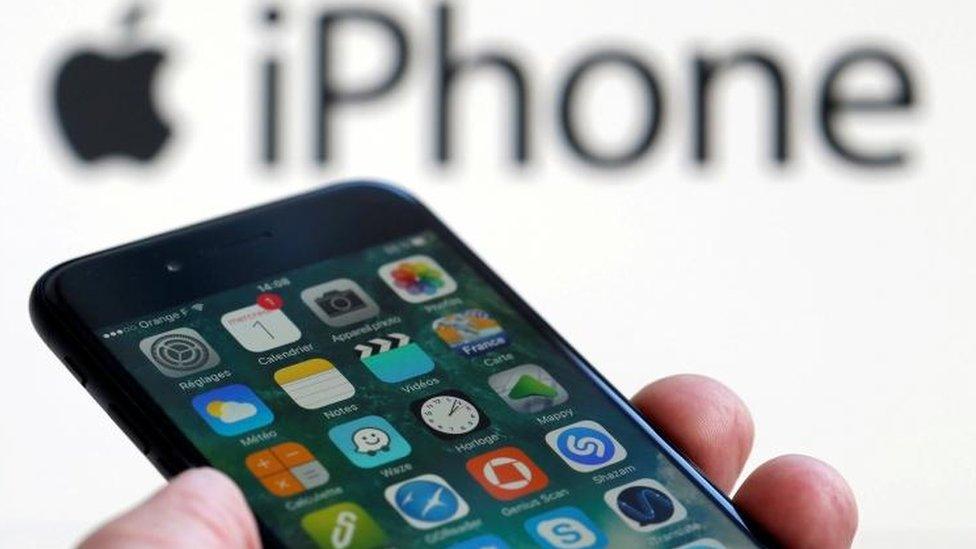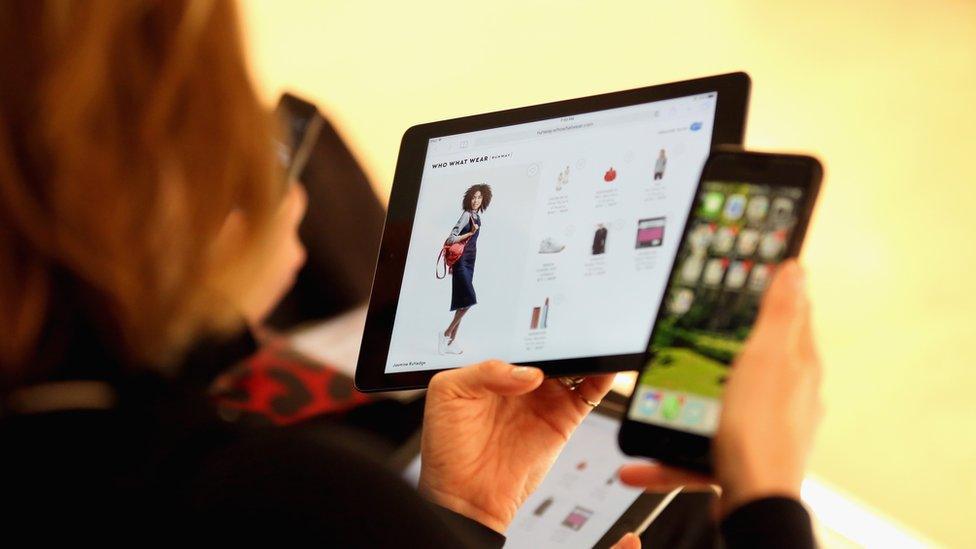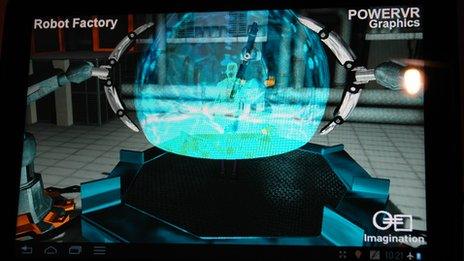Imagination Technologies' shares plunge after Apple ends contract
- Published

Shares in UK chip designer Imagination Technologies have plunged more than 60% after Apple said it would end a deal to use its products.
The US company uses the UK firm's chip technology in its iPhones, iPads, and iPods under a licensing agreement.
Apple's royalty payments account for about half Imagination's revenues.
Shares fell 165p to 103p, valuing the company at about £250m - down from about £765m before the announcement was made on Monday morning.
Imagination said, external Apple, its largest customer, would stop using its products in "15 months to two years".
Apple is developing its own technology, but Imagination said this would be difficult without infringing patents.
Apple has told Imagination that it is "working on a separate, independent graphics design in order to control its products and will be reducing its future reliance on Imagination's technology".
Imagination, like the UK's ARM Holdings, is at the forefront of computer chip technology globally. ARM was sold last year to Japan's Softbank, a deal criticised as selling out of the UK's winners.
The Financial Times reported last year that Apple, which owns 8% of the UK company, had held talks about buying Imagination.
In its statement, Imagination questioned whether Apple would be able to develop its own computer chip designs without breaching its intellectual property rights.
The UK company said: "Apple has not presented any evidence to substantiate its assertion that it will no longer require Imagination's technology, without violating Imagination's patents, intellectual property and confidential information. This evidence has been requested by Imagination but Apple has declined to provide it.
"Further, Imagination believes that it would be extremely challenging to design a brand new GPU architecture from basics without infringing its intellectual property rights, accordingly Imagination does not accept Apple's assertions."

Imagination said in its latest annual report that it has other licensing deals with customers, but described the Apple contract as "essential".
Last year, Apple paid about £60.7m in royalties to Imagination and it is forecast to pay about £65m for the current financial year.

Q & A: Leo Kelion, BBC technology desk editor
Apple's decision to go it alone with the graphics chip technology inside its devices could help the tech giant cut costs and better set the pace of innovation. But doing so risks a legal clash with its former ally, Imagination.
Doesn't Apple already make its own chips?
Apple does indeed design the A10 chip in the iPhone 7, and has developed A-series chips dating back to the original iPad.
But these "system-on-chips" are made up of different components, one of which is a graphics processing unit (GPU). Until now, these GPUs parts have always been customised versions of Imagination's PowerVR designs.
Apple tweaks Imagination's designs to maximise the battery life and performance of its devices.
Why may Apple have an issue with using Imagination's tech?
While Apple has made impressive year-on-year gains with the A-series chips' central processing unit (CPU), improvements to the GPU have been more mixed.
Most recently, Apple has said the GPU in the A10 is twice as fast as the previous generation, but tests show it can only maintain this peak performance for a relatively short amount of time before risking overheating.
That means it has to be throttled back. As a result, testers have given a higher rating to rival GPU tech made by Qualcomm.
What's the difference between a CPU and a GPU?
In basic terms, a CPU calculates single sets of instructions more quickly (or two sets of instructions simultaneously if a dual-core chip is involved), while GPUs specialise in carrying out many calculations at the same time.
This makes GPUs better suited for "parallelisable" tasks - jobs that can be broken down into several parts and run simultaneously because the outcome of any one calculation does not determine the input of another. As the name suggests, powering graphics is one example, but others include speech recognition and pattern matching.
Shouldn't Imagination have expected Apple to go it alone?
Although Apple already designs its CPUs, it bases them on designs from another UK chip architecture specialist, ARM, to whom it pays licence fees.
Imagination has said it doubts Apple can design mobile GPUs in-house without violating its PowerVR patents and other intellectual property.
Apple is not just Imagination's biggest customer, it also owns a stake in the business and had been in discussions to take it over completely at one point.
Apple has, however, hired several former Imagination workers including the former chief operating officer and hardware engineering boss.
According to AppleInsider, at least 25 engineers and managers have quit Imagination and gone on to work at Apple over the past two years.
So even if the current relationship between the two firms is set to end, Apple may still face having to pay Imagination for some time to come to avoid a legal battle.

- Published16 May 2012
